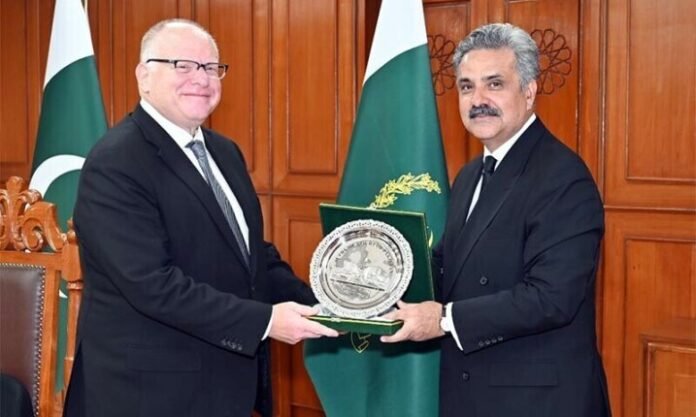ISLAMABAD: A technical team from the International Monetary Fund (IMF), currently in Pakistan to review the judicial and regulatory framework under the $7 billion bailout deal, met Chief Justice of Pakistan (CJP) Yahya Afridi on Tuesday. The discussions focused on programme implementation and property rights.
Meanwhile, Law Minister Azam Nazir Tarar clarified that such meetings fall within the IMF and World Bank’s usual scope of work.
The IMF team is on a week-long visit to assess Pakistan’s judicial and regulatory system under the Extended Fund Facility (EFF), aimed at addressing governance and corruption vulnerabilities. It will review six key governance-related sectors and institutions, according to the Ministry of Finance.
Judiciary’s independence and reforms:
According to a press release from the Supreme Court, CJP Afridi briefed the IMF delegation on “ongoing efforts to enhance judicial performance.” He reaffirmed the independence of the judiciary, emphasizing his role in safeguarding it. He also noted that direct engagement between the judiciary and international financial institutions is uncommon.
CJP Afridi stated that he would be “quite guarded” in his comments and highlighted key constitutional developments regarding judicial reforms, including senior-level judicial appointments, accountability, and restructuring of the Judicial Commission of Pakistan (JCP). He stressed the need for integrating the judiciary with the parliamentary committee to ensure a more transparent and efficient judicial selection process.
He also informed the delegation that the Supreme Court was finalizing a critical agenda for the upcoming National Judicial (NJPMC) meeting, expected in the last week of February. Discussions also covered judicial accountability and mechanisms for handling complaints against judges. The chief justice underscored the importance of a fair and robust accountability process to uphold judicial integrity and independence.
IMF’s recognition of reforms:
The IMF delegation acknowledged the judiciary’s role in maintaining legal and institutional stability and expressed appreciation for ongoing reforms to enhance governance and accountability. The discussion reaffirmed a shared commitment to judicial efficiency and the rule of law as a cornerstone of economic and social progress.
Speaking to journalists after the meeting, CJP Afridi revealed that the IMF’s six-member team sought details regarding programme implementation and property rights.
“I told the IMF that it has come to Pakistan at the best time,” he said, explaining that judges had briefed the delegation on judicial reforms and the National Judicial Policy. The judiciary has asked both the government and opposition for an agenda on judicial reforms, he added.
Additionally, the IMF team made suggestions regarding the protection of property rights. CJP Afridi mentioned that he had discussed the National Judicial Policy-Making Committee’s role and informed the delegation about planned initiatives, including establishing special benches in high courts for early hearings.
According to CJP Afridi, the IMF delegation emphasized its intent to protect foreign investments in Pakistan. However, he clarified that judges are bound by their oath of independence and are not obligated to disclose all details.
Law minister’s statement on IMF’s role:
Separately, Law Minister Azam Nazir Tarar addressed concerns about international organizations influencing judicial matters. Speaking to Geo News, he stated that discussions on the rule of law fall within the multilateral commitments made with institutions such as the IMF, World Bank, and the United Nations.
“The Law and Justice Commission interacts with various international bodies,” he noted. “This is within the domain of the IMF and World Bank.”
Pakistan had committed to the IMF in October to strengthen institutional capacities to combat corruption, promote inclusive growth, and ensure a level playing field for businesses and investments.




